
Since this past March, the travel industry has been at a standstill. Thanks to the COVID-19 pandemic, restrictions on flights all around the world have made it so few people get to go anywhere. And if they DO travel, good luck finding much to do since so much is still closed.
But eventually, this will pass. We will get to travel again, though circumstances are guaranteed to be extremely different. So in addition to making sure to pack your toothbrush and a few changes of clothes, here are five things you need when preparing for travel in the post-COVID era!
A Language Translator Device (such as Jarvisen)

Let's start with one thing that won't change: the language barrier. You'll still encounter plenty of foreign tongues wherever you go so it's important to bring along a good smart language translator device like Jarvisen.
With Jarvisen in hand, you'll be able to expertly and instantaneously translate an incredible 60 languages! You'll know what everyone is saying right as they're saying them, and vice-versa. This helps in every possible situation: business meetings, shopping, conversing with locals, and engaging with foreign family you haven't seen in person since we all went into lockdown.
Plus, if you forget to wash your hands and a local reminds you, it's good to have a Jarvisen handy so you know what they're saying and can easily correct your mistake!
Masks, Gloves, and Other PPE

Make no mistake about it: travel WILL be different post-COVID. Just about anywhere you go, it will be strongly recommended that you wear a mask and possibly gloves. This goes for busy tourist destinations (which will seem less busy with everyone keeping six feet apart from everyone else), restaurants, stores, hotel lobbies, and even walks in public parks or down the street.
In many cases, such PPE will be outright required by law -- if you don't want to risk a fine or possibly worse, make sure to pack your mask and gloves every time you venture somewhere that isn't your guesthouse or hotel room.
Even when visiting countries like New Zealand, that have eradicated the virus to the point where healthy people are not required to wear any PPE, it's good to bring them along just in case. New waves of cases could hit any time so it's best to be prepared.
Debit/Credit Cards

Fewer and fewer businesses want to deal with dirty cash anymore. After all, they don't know where it's been or what droplets have spread on it.
So to ease shopkeeper's concerns (and to keep your own hands clean in the process), use credit or debit cards as much as possible. If your card offers touch-free tap technology, take advantage of it. The fewer objects and machines you and the cashier have to touch, the better peace of mind both of you will have.
And besides: when you're travelling abroad there is no better way to get a great exchange rate than by using a card. According to CreditCards.com, the major card companies set the rates, they're all essentially uniform, and they're often up to 10 percent better than the rates offered by a bank or an airport's currency exchange booth.
So for both health and financial state of mind: obtain just enough cash for your foreign-money collection and use plastic the rest of the way!
Travel Insurance

When's the last time you purchased travel insurance? If you're like most people, it's probably been a while.
But with the unpredictable nature of flights and flight cancellations these days, getting your flight insured is truly important. Let's say another outbreak occurs and the airline industry restricts itself again. Would you rather be out $400 for an unprotected plane ticket, or out the $50 it cost you to purchase insurance on a plane ticket you will now receive a refund for?
So while it's great to shop for a bargain, don't focus so much on saving money that you neglect to protect your flight. In these uncertain times, it's good to know at least one thing is certain.
Extra Travel Time

However much time you put aside for travel, put aside more post-COVID.
For one thing, you or your crew may not want to travel on an airplane and would feel more comfortable in your own car. Obviously, it will take longer to drive somewhere than fly there, so keep that in mind when planning your travel time.
Even if you do choose to fly, prepare to spend more time at the airport than you ever did before. Airports will likely take every precaution necessary for the sake of safe, secure, and clean check-ins.
This, according to CNTraveler, could result in passing through disinfection tunnels, screenings and temperature checks in the parking lot, appointment times to go through security, facial recognition prior to boarding, and other measures that will keep you safe but add time to your travel schedule. If you once arrived at the airport two hours prior to boarding, consider arriving there four hours in advance, going forward. Bring a book or ten -- you'll need them!


Share:
Why Journalists and Reporters Should Use Language Translator Devices
The Top 23 Languages In The World